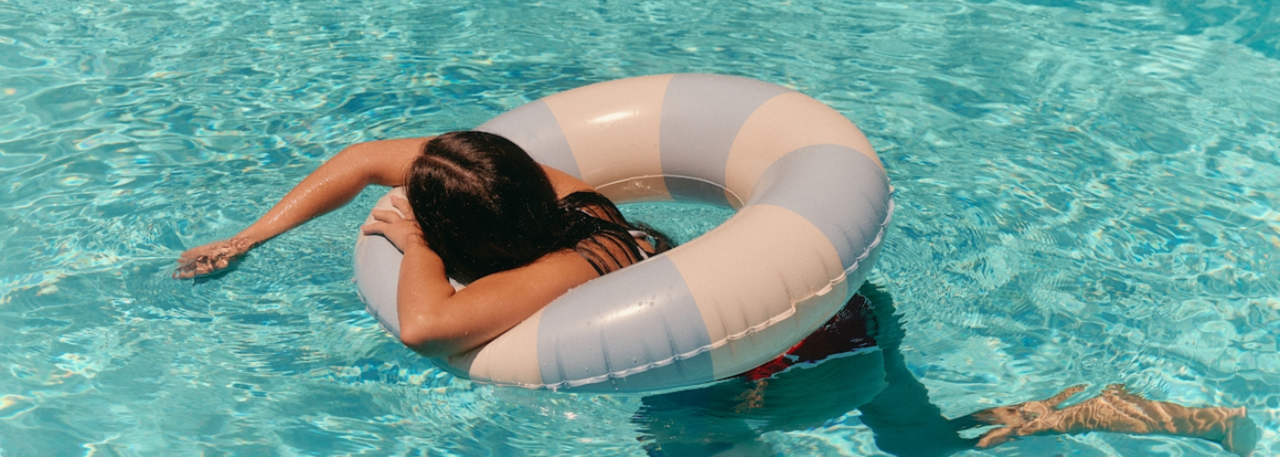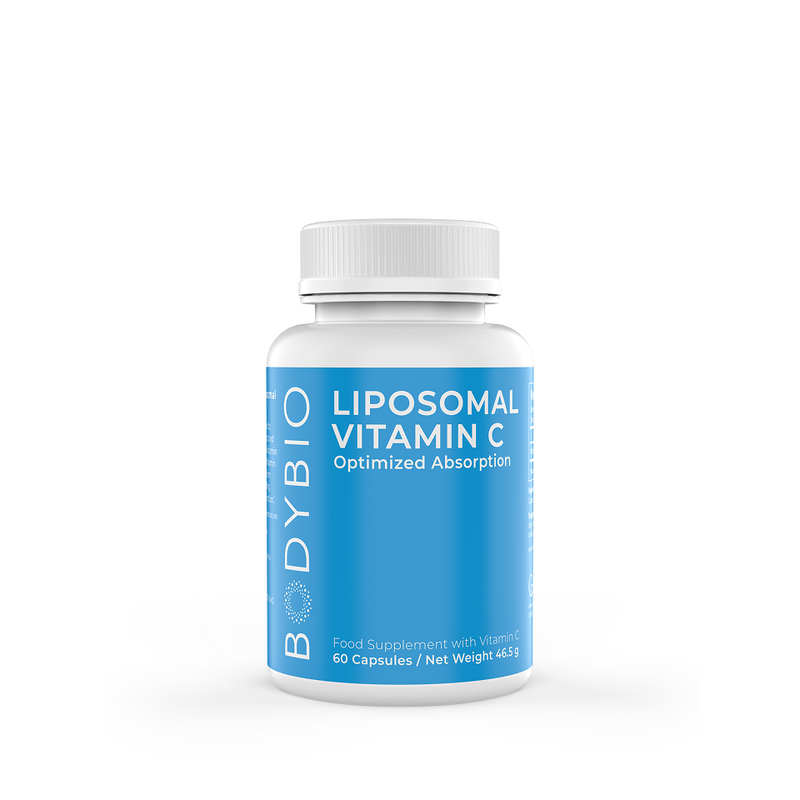7 Sneaky Ways Chlorine Exposure Impacts Your Body (Plus 6 Ways to Protect Yourself)
Key Takeaways:
Chlorine is one of the most commonly used disinfectants in the world — and for good reason. Its ability to neutralize harmful bacteria and pathogens makes it an essential tool for maintaining clean, safe swimming environments. But, while chlorine plays an important role in public health, repeated exposure to chlorinated water may also have unintended effects on the body.
From skin and hair irritation to potential shifts in the microbiome and nutrient depletion, chlorine exposure has been shown to interfere with the body's natural balance in several ways. Fortunately, with targeted strategies and key nutrients — including antioxidant support like vitamin C — it's possible to minimize these effects and support optimal cellular health without giving up your time in the water.
Table of Contents:
What Is Chlorine, and Why Is It Used in Swimming Pools?
Chlorine is a chemical disinfectant widely used to sanitize drinking water, public facilities, and swimming pools. In pool settings, chlorine works by forming hypochlorous acid when added to water. This compound kills bacteria, viruses, and other pathogens that could cause illness when you're exposed to otherwise contaminated water.
While essential for water safety, chlorine's powerful disinfecting ability is not limited to harmful microbes alone. It can also interact with organic material on the skin and in the water — such as sweat, sunscreen, and body oils — producing chemical byproducts like chloramines. These byproducts are often responsible for the characteristic "chlorine smell" around pools and are also linked to many of the side effects associated with chlorine exposure.
How Chlorine Exposure Affects the Body
-
Skin Barrier Disruption
Chlorine strips away oils and microbes, including the skin's natural protective barrier. Frequent exposure to chlorinated water can lead to dryness, flaking, itching, and irritation as the skin loses essential moisture and lipids.
This disruption may also alter the skin microbiome, the diverse ecosystem of beneficial bacteria that supports skin health, immune function, and barrier integrity.
-
Hair and Scalp Damage
Hair exposed to chlorinated water often becomes dry, brittle, and prone to breakage. Chlorine can also bind to proteins in the hair shaft, altering your hair's texture and color over time. The scalp, like the skin, may experience dryness and irritation following repeated exposure.
-
Respiratory Sensitivity
Chlorine byproducts, particularly chloramines, can irritate the respiratory tract when inhaled. This is especially relevant in indoor pools with limited ventilation, where airborne chloramines can accumulate. Individuals with asthma or other respiratory sensitivities may be more susceptible to chlorine-related irritation.
-
Microbiome Disruption
While chlorine's impact on the skin microbiome is well documented, emerging research also suggests that ingesting chlorinated water or absorbing it through the skin may influence the gut microbiome. The gut microbiome plays a critical role in digestion, immunity, and overall health. Disruptions to this ecosystem can have wide-ranging effects on well-being.
-
Nutrient Depletion
Exposure to chlorine has been shown to interfere with the body's nutrient balance, particularly reducing levels of key antioxidants like vitamin C. When antioxidant stores are depleted, the skin may become more prone to dryness and irritation, and the body's natural repair processes may be compromised. Replenishing vitamin C is especially important for supporting collagen synthesis, maintaining skin integrity, and promoting overall recovery after chlorine contact.
-
Eye Irritation and Sensitivity
Chlorine often has a direct impact on eye health, particularly with repeated exposure in pools. The delicate tissues of your eyes are susceptible to irritation from chlorinated water, often leading to redness, dryness, and discomfort. In some cases, chlorine can disrupt the protective tear film that keeps the eyes lubricated, increasing sensitivity. This increased sensitivity can lead to itchy, red or bloodshot eyes, and a burning or stinging sensation.
Pro Tip: Wearing swim goggles can help create a protective barrier for your eyes, reducing direct contact between your eyes and chlorinated water.
-
Immune System Stress and Inflammation
Repeated chlorine exposure may also place extra stress on the immune system. As chlorine interacts with organic material in the water and on your skin, it can generate free radicals and reactive byproducts that contribute to oxidative stress. Over time, this oxidative burden can overwhelm your body's antioxidant defenses, leading to cellular damage and immune dysregulation.
Supporting your body's antioxidant capacity — particularly with vitamin C — is an effective way to help mitigate this immune stress and promote recovery after chlorine exposure.
Long-Term Exposure Considerations
While occasional exposure to chlorinated pools is unlikely to pose significant health risks for most individuals, long-term or frequent exposure may compound these effects over time. This is particularly relevant for swimmers, lifeguards, or individuals with sensitive skin or underlying health conditions.
Supporting the Body's Natural Defenses Against Chlorine Exposure
Managing chlorine exposure is not about total avoidance — it's about supporting your body's natural defense systems and restoring balance.
Topical Strategies
Topical formulas play a vital role in minimizing the effects of chlorine exposure to your skin and hair. The most effective topical approaches focus on creating a barrier, neutralizing chlorine residue, and replenishing lost moisture.
- Rinse Before and After Swimming: Showering before entering the pool can reduce the amount of organic material on the skin, minimizing the formation of chloramines. Rinsing off immediately after swimming helps remove residual chlorine from the skin and hair.
- Moisturize the Skin: Applying a barrier cream or lotion before swimming may reduce chlorine absorption. After swimming, replenish moisture with a nourishing, fragrance-free moisturizer.
- DIY Vitamin C Spray: Vitamin C neutralizes chlorine on contact. A simple topical spray made with vitamin C powder and water can help reduce chlorine's effects on the skin post-swim.
Pro Tip: Keep a small spray bottle of vitamin C solution in your swim bag for convenient post-pool use. Applying it immediately after rinsing off can help reduce irritation and support skin recovery.
Quick and Easy DIY Vitamin C Spray
To make your own vitamin C spray:
- 1 teaspoon vitamin C powder (ascorbic acid)
- 1 cup distilled water
- Optional: 1-2 drops of lavender essential oil for its skin-soothing properties and light, calming scent. Only use 1-2 drops per 1 cup of water-based solution. Essential oils are potent, so adding a small amount is sufficient for skin safety and aroma.
- Optional: A few drops of aloe vera juice, jojoba oil, or coconut oil for added moisture and enhanced absorption. Jojoba oil closely mimics the skin's natural sebum, making it highly absorbable and non-comedogenic (doesn't clog your pores and cause blackheads), while coconut oil provides additional moisturizing benefits and has natural antimicrobial properties. Be sure to shake well before each use since oils tend to separate in water-based solutions.
Instructions: Combine all ingredients in a small spray bottle and shake well before each use. Dark glass bottles are recommended since they are inert, or non-reactive, to the contents inside. Spray directly onto skin after swimming.
Considerations for Children
Children are often more vulnerable to the effects of chlorine exposure due to their smaller size and currently developing skin barrier. Their skin tends to be thinner and more sensitive, making it more prone to dryness and irritation. In addition, kids often spend longer amounts of time in the pool than adults, increasing their exposure.
To help minimize potential irritations and issues, parents can take extra care by:
- Encouraging pre- and post-swim rinses
- Applying a gentle barrier cream or moisturizer before swimming
- Using a vitamin C spray after swimming to neutralize chlorine residue
- Ensuring children stay hydrated and receive adequate antioxidant support through diet or supplements, where appropriate
Pro Tip for Parents: A quick rinse before snacks or a post-swim "skin check" can help kids adopt healthy habits early and make chlorine care feel like a normal part of pool days.
Internal Support
Supporting your body from within is just as important for minimizing the effects of chlorine exposure as it is to protect your body's external features. Nutrition and supplementation can help you replenish depleted nutrients, enhance antioxidant defenses, and promote overall cellular health.
- Hydration: Staying well-hydrated helps support the skin barrier and facilitates detoxification pathways.
- Electrolyte Balance: Replacing electrolytes lost through swimming and sweating can help maintain cellular function and hydration. E-Lyte is formulated to support overall hydration and electrolyte balance.*
- Antioxidant Supplementation: Vitamin C supplementation provides internal antioxidant support to neutralize chlorine-related free radicals. Liposomal Vitamin C offers enhanced absorption, making it an ideal option for individuals with frequent chlorine exposure.*
Pro Tip: Taking vitamin C consistently, not just after swimming, can help maintain a steady supply of antioxidants in the body, providing ongoing support against daily environmental stressors — like chlorine.
Swim Smart: Support Your Body Against Chlorine Exposure
While chlorine plays an essential role in keeping swimming environments safe, repeated exposure may lead to skin and eye irritation, microbiome disruption, nutrient depletion, and other side effects. Fortunately for swimmers and avid pool vacationers, the side effects of chlorine can be managed with a combination of topical care, hydration, electrolyte balance, and antioxidant support.
By taking proactive steps — including using a DIY vitamin C spray, moisturizing regularly, staying hydrated, and supplementing with liposomal vitamin C — you can continue to enjoy the benefits of swimming while supporting your overall health and wellness.








